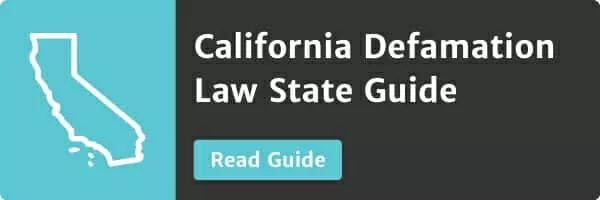
- Originally Published on November 26, 2019
The Minc Law Guide to Colorado Defamation Law
In this comprehensive defamation law guide, we’re going to take you through everything defamation in the state of Colorado. United States defamation and libel laws are highly nuanced, with each state boasting their own twists and turns, so it’s especially important to understand your respective state’s laws.
Specifically, we’re walking you through how Colorado defines defamation, libel, and slander, the most important defamation lawsuit formalities and requirements you should be aware of, and some frequently asked questions. Consider this your ultimate guide to Colorado defamation law!
What is Defamation & How Does Colorado Define It?
“Defamation” is the written or spoken publication or communication of a false assertion of fact, made to a third-party, which causes harm to another’s reputation. As the U.S. is a common law legal jurisdiction (similar to Canada, Australia, and the United Kingdom), defamation of character is classified as a civil wrong and “tort,” ultimately allowing a plaintiff to recover both monetary and non-monetary damages for their harm suffered. Defamation is often referred to as the “tort of defamation” or “defamation of character.”
In this comprehensive Colorado defamation guide, we’ll use these three terms interchangeably when discussing defamation.
Defamation of character, also known as the tort of defamation, can be divided into two core types: libel and slander. When bringing a defamation lawsuit in your state, it’s extremely important to understand the differences between the two, as failing to do so could ultimately lead to having your action dismissed or thrown out.
- Libel: the written or published communication of a false assertion of fact to a third-person, which then causes harm to another’s reputation. Libel will cover all written statements, along with media (photographs, videos, and anything else that may be preserved in a tangible format).
- Slander: the spoken false assertion of fact to a third-person, which then causes harm to another’s reputation. While you might initially think that YouTube videos and other media involving speaking would be considered slander, it’s actually classified as libel. Any guesses why? Because it’s preserved in a tangible medium.
In our tenure as experienced Internet defamation removal attorneys, it’s become incredibly clear that the average person frequently confuses both libel and slander with one another, and often uses “slander” as the overarching term for every single defamation publication and communication. The reality of today’s defamation landscape is that the majority of malicious attacks and false accusations occur on the Internet, so libel has actually become the most popular form of defamation.
In order to help you better remember the major difference between libel and slander, let’s go all the way back to your high school Latin class. “Libellus” literally means “booklet” or “small book.” So, anytime you see a defamatory communication that is published in a “small booklet,” then you’re likely dealing with the tort of libel.
Finally, defamation can also be referred to as:
- Character assassination
- Calumny
- Vilification
- Traducement
- Disparagement
While disparagement comes close to covering defamation, it doesn’t quite hit the nail on the head. Instead, disparagement refers to false statements of fact which cause damage to a person or entity’s financial or proprietary rights, NOT their reputation. Because of its association with businesses, it’s generally referred to as “the tort of business disparagement” or “the tort of commercial disparagement.” You can read up more about disparagement, how its fundamental elements differ from defamation, and more, by heading over to our comprehensive guide, What is Business/Commercial Disparagement?
So, what should you call a party who defames, libels, or slanders another individual?
- Defamer: The all-encompassing term for persons who communicate or publish a false assertion of fact to a third-party, and subsequently causes harm to another’s reputation.
- Libeler: A person who publishes a false assertion of fact to a third-party, which causes harm to another’s reputation.
- Slanderer: A person who verbally communicates a false assertion of fact to a third-party, which causes harm to another’s reputation.
- Famacide: This is an extremely outdated term that literally translates to “one who destroys another’s reputation.”
Now that we’ve walked you through the basics of the most important defamation terms in the U.S., let’s now take a look at Colorado’s defamation definition, and the elements a plaintiff must prove in order to succeed in their defamation lawsuit.
Colorado Defamation of Character Law Definition
Under Colorado defamation laws, a statement will be considered defamatory if it tends to harm a person’s reputation by prejudicing or lowering them in the estimation of at least a substantial and respectable minority of the community.
Specifically, to be actionable under Colorado defamation law, a statement must be:
- Published
- False
- Made with knowledge of or reckless disregard for its falsity
- The cause of damage to the subject of the statement
- Defamatory
However, to find out whether a statement is actually defamatory, a court must first consider the context of the entire story and the common meaning of the words used.
Colorado recognizes the doctrine of substantial truth when analyzing whether a statement is defamatory or not. Simply put, the doctrine of substantial truth looks to see if the bulk or the “sting” of the statement is substantially true, and but for minor inaccuracies and falsities, it will give rise to an actionable defamation claim.
Colorado courts have used the incremental harm analysis with respect to the issue of substantial truth, and determining the presence of a knowing or reckless falsity. The incremental harm doctrine and analysis measures the damage inflicted upon a plaintiff by the challenged statements beyond the damage caused by the non-actionable portions of the statements or publication.
Additionally, courts will conduct a de novo examination of the words at issue in order to determine their “gist,” and whether that meaning is defamatory, as part of its consideration of whether an actionable statement is present.
Let’s take a look at several Colorado defamation cases to get a better understanding of what they DO and DO NOT consider defamatory.
Colorado Defamation Cases
- Near naked photographs and allegedly false reviews posted on RipoffReport.com were sufficient to state a claim for defamation. Atl. Bldg. Sys. V. Great W. Bldg. Sys., No. 2016 CV 33066, 2018 Colo. Dist. LEXIS 635.
- YouTube videos accusing a person of criminal conduct were ruled to be defamatory, and sufficient to obtain a preliminary injunction for their removal.
- A man’s Facebook posts accusing his ex-wife’s new husband of rape and child abuse were found to constitute defamation in a 2015 Colorado defamation case.
- A graphic designers posts on social media and online forums claiming that an online illustration company had both stolen his art and was suing him for selling his own artwork was found to be defamatory. The reason? The company hadn’t actually sued him and was the true owner of the artwork that the graphic designer had been selling as his own.
One important note about Colorado’s defamation definition is that courts appear to be conflicting on whether the statement must be “of and concerning” the plaintiff. The Colorado Revised Statutes provide:
“It shall not be necessary to state in the complaint any extrinsic facts for the purposes of showing the application to the plaintiff of the defamatory matter … [i]t shall be sufficient to state generally that the same was published … concerning the plaintiff … [subject to proof at trial if controverted].”
In other words, the Colorado Supreme Court in Lininger held that when extrinsic facts are required to show application to the plaintiff, the publication is not libelous per se and is subject to dismissal in the absence of pleading and proof of special damages.
However, the Colorado Court of Appeals declined to follow Lininger and instead held that “whether the statement is directed at the plaintiff can be established by extrinsic proof without rendering the publication defamatory per quod.” Do keep in mind that this decision is at odds with other Colorado precedents on this issue, including Lininger, Inter-State Detective Bureau, Inc., and Lind.
A 2015 case ruled that a case is subject to dismissal if there is no allegation that the statement was made “concerning the plaintiff.” Deatley v. Allard (2015).
- Of and Concerning a Deceased Person: The United States District Court for the District of Colorado held that publication of a police report that the plaintiffs’ father committed suicide was not libelous per se of the plaintiffs because it was specifically directed at the deceased, not at the plaintiffs.
- An Unnamed Party: The Colorado Supreme Court held that references to an unnamed judge in a letter to the editor was shown by sufficient extrinsic proof to apply to the plaintiff for purposes of fulfilling the “statement of fact” requirement set.
Now, let’s turn to Colorado’s defamation pleading standard for libel and slander actions.
Colorado’s Defamation Pleading Standard
Before we dive into Colorado’s defamation of character pleading standard, let’s first understand why our judicial system requires pleadings and how they ultimately enable for a more efficient and fair legal framework. We bet you’ve likely heard one of the following terms in a popular television legal drama or movie before.
First, what are pleadings and what do they cover?
Pleadings are simply a special word for the formal written documents, statements, and requirements which initiate a lawsuit and are first filed with the court by the plaintiff (of course!). They generally include:
- A statement of the facts
- Accusations and allegations by the plaintiff
- The fundamental issues driving the case
- Potential defenses a defendant may choose to rely upon
After the plaintiff files their initial pleadings, a defendant will then be given the opportunity to respond (answer).
Below are several of the most commonly filed pleadings in the U.S. and Colorado.
- Complaint: the initial document filed by the plaintiff outlining their core facts, issues, and claims. Complaints will also include a “prayer for relief,” which is just a request for monetary or non-monetary damages.
- Answer: the response the defendant to the plaintiff’s complaint, affirming or denying the allegations set forth. The defendant will generally raise any defenses they may rely upon in their answer.
- Reply: the plaintiff’s response to the defendant’s answer, addressing any newly raised issues of fact, arguments, or claims.
- Counterclaim: in some cases, a defendant may choose to file a separate and distinct legal claim against the plaintiff, with the intention of offsetting the plaintiff’s initial complaint.
Do understand that most U.S. states will differ (sometimes significantly) in their defamation pleading requirements and standards. For example, some states may choose to differentiate between libel and slander for purposes of their statute of limitations, while others may group both under one uniform statute of limitations time-frame.
Furthermore, some U.S. states may require a libel or slander plaintiff to plead their claim with a heightened degree of specificity, while others will settle for a simple explanation of the statement.
If you’re unsure of Colorado’s defamation of character laws, and want to better understand your rights, reach out to the experienced Internet defamation lawyers of Minc Law today!
Now that we’ve walked you through what pleadings are, let’s take a look at Colorado’s defamation of character pleading standard.
Under Colorado’s defamation law statute, claims for defamation must be specific, including the exact words being claimed as defamatory.
Colorado Defamation Per Se: What is Defamation Per Se?
Defamation per se, also known as slander per se or libel per se (depending on the form in which is conveyed), refers to certain types of defamatory statements that are inherently inflammatory and attack a person in intimate or other ways. As the allegedly defamatory statements in question are so inherently inflammatory, a plaintiff need not prove damages when bringing their claim.
Specifically, Colorado’s defamation per se law covers false statements that necessarily involve significant damage to a target’s reputation – and thus, requires no proof or pleading of economic loss or special damages.
To qualify as libel per se in Colorado, the publication must contain defamatory words specifically directed at the person claiming injury, which words must, on their face, and without the aid of extrinsic proof, be unmistakably recognized as injurious.
Most states recognize the below four categories as defamatory per se:
- Statements accusing someone of having committed a crime
- Words imputing an infectious disease upon someone (usually an STD or leprosy)
- Statements imputing sexual promiscuity or unchastity upon someone
- Statements that prejudice someone in his or her profession, trade, or business.
Below are three Colorado defamation per se cases.
Colorado Defamation Per Se Cases
- YouTube videos accusing an attorney of domestic violence, assault, homicide, and other crimes were held to be libelous per se in Colorado.
- A Facebook message with the implied accusation that a third-person may have committed rape qualified as defamatory per se under Colorado defamation statute.
- The Colorado Court of Appeals held that an online statement that an art dealer’s company was “comparable to the ‘Man in Black’ for Mozart” was not defamatory per se as it lacked underlying, verifiable factual assertions.
Defamation per se lawsuits will enjoy “presumed damages” due to a plaintiff not having to prove damage to their reputation. We’ll get deeper into the respective damages associated with defamation per se cases in Section 5, so skip ahead to their if you’d like to read up on it now.
Now, let’s take a look at the other side of the coin to see defamation per se’s very opposite cousin: defamation per quod.
Colorado Defamation Per Quod
Defamatory statements which do not attack one of the above four categories will likely be considered defamation per quod, and require defamation plaintiffs to provide supporting evidence of the statements or publications in question.
Under Colorado defamation law, defamation “per quod” is defamation which does not carry a defamatory imputation on its face, and thus, requires extrinsic evidence to establish defamatory meaning.
For example, in one 1971 Colorado defamation law case, a newspaper article calling repo men thieves was held to be libel per quod because the accusation connected to the repossession company only by inference.
Just as defamation per se is accompanied by presumed damages, defamation per quod is associated with actual damages, which we will also dive deeper into in Section 5.
Colorado Defamation By Implication
Colorado does recognize the legal doctrine of defamation by implication when the implication is clear. However, in the case of NBC Subsidiary, a Colorado court took a narrow view of the concept of “libel by innuendo.”
Do understand that the applications of the definition is not always predictable or consistent under Colorado defamation laws.
Defamation Removal Tip: When seeking to remove libelous and false online materials, we recommend documenting and preserving all relevant evidence. This includes all photographs, videos, media, statements, blog posts, comments, URLs, and search results. Make sure to timestamp your screenshots as well, as it’s extremely important to craft as comprehensive of a timeline as possible.
If you’re still unsure about Colorado’s defamation of definition, how to file a defamation lawsuit in Colorado, and how to stop libeous and malicious online attacks as soon as possible, reach out to the nationally recognized online defamation removal lawyers of Minc Law as soon as possible.
Contact us today to schedule your free, initial no-obligation defamation consultation with an intake specialist by calling us at (216) 373-7706, or by filling out our contact form online.
Let’s put an end to the online abuse NOW!
Important Colorado Defamation Formalities & Requirements
The U.S. has one of the most complex and highly nuanced legal systems in the world, making it no small task for defamation victims looking to put an end to defamatory online attacks and accusations.
Both Colorado and the U.S. have countless hurdles for defamation plaintiffs to jump over in order to succeed in their libel or slander claim. In this section, we’re going to take you through the most important Colorado defamation law formalities and requirements.
More specifically, we’re going to walk you through:
- Whether Colorado courts have jurisdiction over out-of-state defendants
- Where Colorado defamation plaintiffs may sue for defamation
- Colorado’s defamation statute of limitations
- Several explanatory defamation cases in Colorado
Do Colorado Courts Have Legal Jurisdiction Over Out-of-State Defendants?
Unfortunately, there is no straight-forward answer here, as Colorado defamation law and jurisdiction is quickly evolving due to the spread of the Internet and commission of cyber-crimes.
We can, however, let you know when Colorado courts have ruled that they do not have subject matter jurisdiction over defamation claims and defamation defendants.
Three Cases Where Colorado Courts Ruled Against Jurisdiction Over Defamation Defendants
In Hummel, the Colorado Court of Appeals determined that it did not have subject matter jurisdiction to adjudicate defamation claims when the defamatory statements in question relate directly to a church process that resulted in the termination of clergy. The plaintiffs were senior pastor and associate pastor of the defendant church and the statements arose out of a church meeting at which a petition for the removal of the plaintiffs was signed.
The Court of Appeals ultimately affirmed the trial court’s dismissal of the claim for lack of subject matter jurisdiction on the ground that the statements were protected by the Free Exercise Clause and the Establishment Clause of the First Amendment. Resolution of the claims would have required assessment of the motives of the church members who uttered the allegedly defamatory statements.
In Giduck, the Court held that six foreign defendants were not subject to the court’s personal jurisdiction for statements they posted on the Internet about the Colorado-based plaintiff. Most notably, the Court surveyed the cases from across the nation holding that merely posting something on the Internet, with awareness that it will be read in the plaintiff’s state of domicile, does NOT subject the publisher to specific personal jurisdiction in that state.
In addition, the court found that the Plaintiff had not adequately pleaded a conspiracy between the foreign defendants and a Colorado resident that would subject them to personal jurisdiction even if such a conspiracy could be the basis for personal jurisdiction.
Finally, in Advanced Career Technologies, Inc., the United States District Court for the District of Colorado dismissed for lack of personal jurisdiction an action based on alleged defamatory statements made by a defendant blogger – a Maryland resident – and unknown others commenting on the blog against a Colorado based business.
Despite allegations that the defendant knew the plaintiff’s principal place of business was in Colorado and that the defendant designed the blog to target the plaintiff and related companies, the Court held that the plaintiff failed to establish either specific or general jurisdiction over the defendant.
And, as to specific jurisdiction, the Court noted that the Tenth Circuit applies a “restrictive approach” and held that there was no specific jurisdiction because the “Defendant targeted the blog and his messages ‘at a nation-wide or world-wide audience … with no inherent interest in or tie to’ Colorado.” Furthermore, the Court declined to attribute the posts of anonymous commentators to defendant.
As to general jurisdiction, the Court held that “[n]or is there any indication that Defendant sufficiently altered the ‘passive’ nature of the blog so as to support general jurisdiction.” Finally, the Court found that the conclusory and speculative allegations did not support jurisdiction based on a conspiracy theory.
Colorado Long-Arm Statute
A long-arm statute is simply a statute which prescribes for specific situations when a court may exercise jurisdiction over a defendant or matter occurring outside of their state lines.
Colorado’s long-arm statute will extend in the following situations:
- “Engaging in any act enumerated in this section by any person, whether or not a resident of the state of Colorado, either in person or by an agent, submits such person and, if a natural person, such person’s personal representative to the jurisdiction of the courts of this state concerning any cause of action arising from:
- The transaction of any business within this state;
- The commission of a tortious act within this state;
- The ownership, use, or possession of any real property situated in this state;
- Contracting to insure any person, property, or risk residing or located within this state at the time of contracting;
- The maintenance of a matrimonial domicile within this state with respect to all issues relating to obligations for support to children and spouse in any action for dissolution of marriage, legal separation, declaration of invalidity of marriage, or support of children if one of the parties of the marriage continues without interruption to be domiciled within the state;
- The engaging of sexual intercourse in this state as to an action brought under Article 4 or Article 6 of Title 19, C.R.S., with respect to a child who may have been conceived by that act of intercourse, as set forth in verified petition; or
- The entering into of an agreement pursuant to Part 2 or 5 of Article 22 of this title.” C.R.S. § 13-1-124.
Simply put, the Colorado long-arm statute will extend:
- Business: When business is transacted within the state,
- Torts: A tortious act is committed in the state,
- Property: Property and ownership is situated in the state,
- Contract: A contract governs person, property, or risk within the state at the time of contract
- Marriage: In cases of maintaining matrimonial domicile
- Sex: Sexual intercourse pursuant to Title 19, of Colorado’s Revised Statute.
Colorado Choice of Law: Which Laws Do They Apply?
Choice of law simply refers to a specific step in the litigation process whereby varying legal jurisdictions and states lay claim to an issue and decide the proper place for the case or issue to be tried – the “proper law” if you will.
When deciding which state’s laws to apply and where the issue should be tried, courts will generally look to several competing factors. For example, some of the most common factors to determine where to adjudicate include: where a contract was executed and is enforceable, where two persons married, the domicile of a married couple, and where the tort in question was perpetrated.
Keep in mind that the above examples are just several factors courts may look to when choosing the proper law.
So, how does Colorado handle choice of law?
With regard to choice of law in Colorado, the United States District Court for the District of Colorado has ruled that under Colorado conflict of law rules, the law to be applied in a libel action is that of the state having the most significant relation with the parties in communication. In single-state defamation cases, this is usually the law of the state where the publication of the defamatory material occurred, while in multi-state cases (two states competing for the claim), the law of the state of the plaintiff’s domicile usually applies.
Let’s take a look at four cases showing how Colorado handles choice of law in defamation and libel cases.
- In Zimmerman, the allegedly defamatory article, though printed in Michigan, was “published” in Colorado through distribution of the same in the state. The plaintiff and its affiliated organizations, the subjects of the article, were Colorado residents, and the harm allegedly suffered by the plaintiff occurred in Colorado. In light of these factors, Colorado had the most significant relationship to the plaintiff’s defamation claim and its law applied.
- In Ramsey, the allegedly defamatory broadcast reached millions of viewers throughout the country and the world. The broadcast, produced by the defendant’s Colorado-based employees, reported on the murder of the plaintiffs’ daughter in their Colorado home, and featured interviews with a number of Colorado-based sources. The plaintiffs, who lived in Georgia at the time of the broadcast, had filed suit there. A Georgia-based federal district court judge transferred the case to the District of Colorado, which, applying the “most significant relationship test” in accordance with Georgia’s choice-of-law statute, found that Colorado’s ties with the case were stronger and applied Colorado’s substantive law.
- In Shrader, although the plaintiff was a resident of Oklahoma, the court applied Colorado law, because the defendants were a Colorado corporation and a Colorado resident, the defamatory posting to an online forum occurred.
- In Shoen, the Colorado Court of Appeals held that the plaintiff waived his right to assert that Arizona and not Colorado law applied when the plaintiff first raised the issue more than 28 months into litigation.
Colorado Defamation Statute of Limitations
Before we dive into Colorado’s defamation statute of limitations, let’s first take a look at the very principles driving their implementation and how they ultimately enable a more efficient working legal system.
For starters, a statute of limitations is simply a time-limiting mechanism and restraint which “limits” a person’s ability to bring legal actions. Should a person fail to initiate their lawsuit within the prescribed statute of limitations (time-frame), then they may risk being barred from bringing their claim at all.
Video: What is the Statute of Limitations for Defamation in the U.S.?

So, what are the core ideas driving a statute of limitations?
- Preservation of evidence: Evidence can quickly disappear. After all, people aren’t generally anticipating lawsuits to arise very frequently. Furthermore, evidence is time-sensitive when it comes to defamation cases, especially slander (due to it being oral in nature). Statutes of limitations help reduce the chances that a person has intentionally or unintentionally destroyed evidence that may be material to a case.
- Reasonable diligence: It’s no surprise that our legal system is not the well-oiled machine it once was, and is unfortunately bogged down by countless frivolous and inactionable cases. Statutes of limitations help act as a safeguard against the filing of frivolous and unnecessary lawsuits, as they require people to initiate their lawsuit within a reasonable time – and more importantly,
- Prevention of “more cruelty than justice”: Because statutes of limitations help provide notice to respective parties about the action itself, this ultimately enables for a more equal legal ecosystem, where “more cruelty than justice” is eliminated.
So, how long is Colorado’s defamation statute of limitations?
The statute of limitations for a defamation action in Colorado is one (1) year. Additionally, a defamation action must be brought within one year after the cause of action accrues, which is the date that both the injury and its cause are known or reasonably should have been known by the exercise of reasonable diligence.
An action for trade libel, however, is subject to the two-year general tort statute of limitations.
Finally, a plaintiff cannot revive a stale defamation claim under Colorado’s claim revival statute by holding back on asserting the claim until after the defendant pleads counterclaims.
For example, a defamation claim stemming from an online listing that mislabeled the plaintiff’s criminal history was denied because that plaintiff waited five years after discovering the mistake to file his claim.
So, how does Colorado’s defamation statute of limitations compare to other states?
| Colorado | One (1) year |
| District of Columbia | One (1) year |
| Michigan | One (1) year |
| Pennsylvania | One (1) year |
| Ohio | One (1) year |
| New Jersey | One (1) year |
| Texas | One (1) year |
| Georgia | One (1) year |
| California | One (1) year |
| Illinois | One (1) year |
| South Carolina | Two (2) years |
| Florida | Two (2) years |
| Nevada | Two (2) years |
| Massachusetts | Three (3) years |
| Wisconsin | Three (3) years |
Online Defamation Removal Tip: Preservation of evidence is absolutely essential when combating fake online reviews, defamatory attacks, internet blackmail, and malicious comments. We recommend screenshotting all relevant materials, copying the URL of a libelous and fake post, and time-stamping it. Doing so will ultimately help increase the chances of your Internet defamation claim succeeding. We also recommend utilizing Google Alerts to receive daily and weekly alerts anytime your name and inserted keywords are mentioned anywhere online.
Single Publication Rule in Colorado: Do They Enforce It?
The single publication rule is a common legal doctrine and (also) time-limiting restraint, which limits a person’s ability to bring more than one defamation action for each subsequent publication after the original. Simply put, you get one chance at a lawsuit for the original publication. Without the single publication rule, we’d potentially see new lawsuits popping up every minute after subsequent publications of a defamatory statement.
Do understand that if the defamatory publication or communication is actually materially altered, then this will likely give rise to a new defamation action.
Colorado has not legislatively adopted the Uniform Single Publication Act. Likewise, Colorado appellate courts have not considered the question of whether the single publication rule will be applied in determining when the statute of limitations begins to run with respect to newspapers, books, and/or magazines, but the rule would PROBABLY be applied.
The district court in Goodyear Tire shed some light on the matter and concluded that Colorado courts would apply the single publication rule to Internet publications. Additionally, the Colorado Supreme Court held that each subsequent rereading of a publication by other persons is not a separate and distinct publication for which a defendant can be held liable anew.
Private v. Public Defamation Plaintiffs: Which One Am I?
When bringing a defamation action in the United States, it’s crucial to understand that a libel or slander plaintiff’s remedies WILL hinge on their status in society: whether they are a private or public figure. Depending on which type of plaintiff you are categorized as, your burden of proof will differ, so it’s extremely important to understand where you fall in society’s eyes.
In this section, we’re going to walk you through the two specific types of defamation plaintiffs in the U.S., private and public plaintiffs. After reflecting on your contributions and prominence in society, we suspect you might ultimately be surprised at which type of plaintiff U.S. courts will consider you!
First, let’s take a look at the fundamental reason why the U.S. legal system differentiates between private and public defamation plaintiffs.
Why the U.S. Distinguishes Between Public & Private Plaintiffs
The distinction between private and public defamation plaintiffs was first discussed and ruled on in the historic case of New York Times Co. v. Sullivan. In Sullivan, the United States Supreme Court emphasized, for the sake of society and the furtherance of uninhibited debate, there need be distinct burdens of proof to be met for different types of societal figures.
They further noted that public figures are persons have either voluntarily or involuntarily thrust themselves to the forefront of public comment, critique, and view, so it was important that they should be held to a stricter standard when bringing claims. Think about, should the general public be barred from discussing prominent figures in society (and also criticizing them), our democracy would ultimately be uprooted and highly censored.
Let’s take a further look at the two types of defamation plaintiff classes that the court in New York Times created, along with their respective burdens of proof which must be met for a plaintiff to succeed in their claim.
- Private persons/plaintiffs: If you’re reading this, there’s a good chance you’re classified as a “private person or plaintiff,” as you likely have not voluntarily or involuntarily thrust yourself to the forefront of public comment, discussion, or critique. Private persons well…like to keep their life private, and as such, have a less strict burden of proof to meet in order to succeed in their libel or slander action. Private plaintiffs must prove a defendant published or communicated a defamatory statement with at least ordinary negligence, and acted outside the scope of how a reasonable person would act in similar circumstances.
- Public persons/plaintiffs: Public persons and plaintiffs are individuals with some clout or prominence in society. These are most commonly your celebrities, TV actors, sports athletes, and politicians. They also sometimes include persons who have availed themselves to public comment and critique for a specific purpose. As it’s in society’s best interest to be able to freely discuss these individuals, public persons and plaintiffs boast a significantly stricter burden of proof. Public plaintiffs must prove a defendant published or communicated a defamatory statement with actual malice or reckless disregard.
Let’s have a quick look at how Colorado defines “actual malice,” so you have an idea of the type of standard applies, requisite awareness, and more.
Colorado Actual Malice Standard for Public Figures & Public Officials
In defamation cases involving public officials, public figures, or matters of public concern, plaintiffs must not only show by clear and convincing evidence that the statements made were false and defamatory; but also that they were made with knowledge of or reckless disregard for their falsity, a standard known as actual malice.
Actual malice is a SUBJECTIVE standard, which is not satisfied by proof that the defendant, if he were a reasonable person, “in the same or similar circumstances… would have had a high degree of awareness of the statement’s probable falsity or would have entertained serious doubts as to the truth of her statement.” It is likewise not enough that a defendant ‘should have’ had serious doubts, they must actually have had serious doubts about the truth of their defamatory allegations.
The fact “that a reasonably prudent person would not have published the defamatory statement or would have investigated before publishing does not suffice” to show actual malice.
Do note that at least one Colorado court seemed to recognize that actual malice requires a knowing or reckless state of mind, not only as to the falsity of the publication as understood by the reader, but also as to the likelihood that the words would carry a false and defamatory meaning.
Let’s turn to three examples which help further shed light on Colorado’s actual malice standard.
- No actual malice was found when a journalist showed a good-faith belief that the allegedly defamatory statements were true.
- Proof that an account of a court filing was false, on its own, was insufficient to establish actual malice in one Colorado legal case. Because “[t]he article did not assert that the allegations were true. Hence, because the published statements did not go beyond the scope of the document it purported to summarize, no corroboration or investigation was called for.” Student v. Denver Post Corp., No. 95CA0724, 24 Media L. Rep. 2527, 2530 (Colo. App. Aug. 29, 1996).
- A journalist published an article accusing local parks and recreation officials of accepting inappropriate gifts from a ski lodge in the area. The Colorado Supreme Court held that the actual malice standard was satisfied, due to the journalist’s “grossly inadequate” investigation prior to publishing.
While the above are two broad categories of libel and slander plaintiffs in the United States, most states have actually narrowed the scope even further, recognizing four distinct types of defamation plaintiffs.
- Private plaintiffs
- Public officials
- General purpose public figures
- Limited-purpose public figures
| Colorado's Four Classifications of Defamation Plaintiffs | Private Plaintiffs | Public Officials | Public Figures (General-Purpose) | Limited-Purpose Public Figures (LPPFs) |
|---|---|---|---|---|
| Definition | Private persons can be defined as individuals not falling with any of the other three categories, and are persons who have not voluntarily or involuntarily availed themselves to the general public for comment, critique, or criticism. | Colorado courts follow the New York Times rule in determining what constitutes a public official. “[T]he ‘public official’ designation applies at the very least to those among the hierarchy of government employees who have, or appear to the public to have, substantial responsibility for or control over the conduct of governmental affairs.” | General-purpose public figures are typically persons who have assumed roles of certain prominence in today’s society or affairs and occupy positions of pervasive power or influence. | Colorado’s definitions of pervasive and limited purpose public figures track those of the U.S. Supreme Court. In Diversified Management, Inc., the Colorado Supreme Court held that a corporation does not become a public figure because of its corporate status, government regulation or “merely by availing itself of the marketplace.” The issue is of limited significance in Colorado, where the New York Times rule applies to all publications involving matters of public or general concern. Under Diversified Management, Inc., the Sullivan rule applies to all defendants when the public involves an issue of public concern. The Civil Jury Instruction Committee takes the position that when the plaintiff is a private person and the subject matter also private, Common Law rules apply. |
| Burden of Proof | Ordinary Negligence | Actual Malice | Actual Malice | Actual Malice |
| Examples | 1. Online statements about a plaintiff’s business activities did not involve a matter of public concern because there was no evidence that anyone besides the private parties were affected or that any government entities had become involved. Zueger v. Goss, 343 P.3d 1028 (Colo. App. 2014). 2. The Colorado Court of Appeals affirmed a district court ruling that a bookkeeper who had applied for a job with a homeowners’ association was not a “limited purpose public figure.” McIntyre v. Jones, 194 P.3d 519 (Colo. Ct. App. 2008). | 1. Police officers are held to be public officials. Willis v. Perry, 677 P.2d 961 (Colo. App. 1983). 2. The Colorado Court of Appeals noted that a public-school teacher was probably a ‘public official’ even though the plaintiff did not contest that the actual malice standard applied. Hayes v. Smith, 832 P.2d 1022 (Colo. App. 1991). | The most common types of general purpose public figures are celebrities, politicians, sports athletes, and other persons with notable prominence in societal affairs and interest. | 1. The Colorado Court of Appeals held that a plaintiff who had filed a widely publicized civil rights lawsuit claiming racial discrimination against a department store which had her arrested for shoplifting was a “limited purpose public figure” for purposes of a broadcast report about her arrest record where she and her attorney had purposely sought public and media attention to gather public support for her civil rights suit. Lewis v. McGraw-Hill Broadcasting Co., 832 P.2d 1118 (Colo. App. 1992). |
Defamation Law Fact: The United States is typically considered a very pro-defendant libel and slander jurisdiction due to its longstanding enforcement of the First Amendment and U.S. Constitution. Other Common Law countries (along with European countries) are however considered pro-plaintiff legal jurisdictions.
Colorado Issues of Public & Private Concern
Just as defamation plaintiffs have specific burdens they must meet in order to succeed in their libel or slander claim, certain types of issues require a specific burden of proof be met as well – all in the furtherance of uninhibited debate and discussion in today’s society.
Just as it would ultimately hinder and censor public discussion of specific figures in society should we allow for lawsuits against them at nearly any time, it too would hinder public discussion and democratic debate should persons face legal repercussions for discussing hot topics and important issues.
For example, when addressing private issues, plaintiffs will generally need to prove that the defendant acted with at least ordinary negligence when publishing or communicating their statement. And, when discussing issues of public concern, plaintiffs will generally need to prove a defendant published the statement with actual malice or reckless disregard.
In Diversified Management, Inc., the Court reaffirmed that when a defamatory statement has been published concerning one who is not a public official or public figure, but the matter involved is one of public or general concern, the publisher of the statement is liable only if he knew the statement to be false or made the statement with reckless disregard for whether it was true or not.
Further, the court adopted the St. Amant statement of “serious doubts” as a test of reckless disregard. It also reaffirmed “clear and convincing” as the burden of proof.
Both rulings were predicated upon Article II, Section 10 of the Colorado Constitution. Hence, in Colorado all aspects of the New York Times rule apply to publications involving matters of public or general concern, regardless of the status of the plaintiff.
At the time of publication, there are no other notable cases where Colorado courts have tackled issues of public and private concern. We recommend looking to the above cases on public and private plaintiffs for further clarification.
If you’ve been the victim of defamatory attacks, online extortion, or Internet blackmail, it’s important to reach out to the experienced Internet attorneys of Minc Law as soon as possible! At Minc Law, we know what it takes to get your life back to normal and hold the perpetrators in question liable. And, we have proven success doing so.
Contact us today to get started. To schedule your free, initial no-obligation consultation with an intake specialist, call us at (216) 373-7706, or fill out our contact form online.
Now that we’ve walked you through the requisite elements a Colorado defamation plaintiff must prove in order to succeed in their libel or slander suit, the various types of defamation plaintiffs recognized under Colorado defamation statute, and the most important defamation action requirements and formalities, let’s take a look at some of the most popular defenses to libel and slander actions!
Popular Defenses to Colorado Defamation Actions
As you can already tell, the U.S. legal system is extremely complex, offering up countless hurdles one needs to jump over in order to succeed in one’s legal claim. As if the requisite formalities and requirements weren’t enough for lodging a successful libel or slander claim, there’s also a number of legitimate defenses a defendant may raise in order to skirt liability altogether.
In this section, we’re going to walk you through several of the most common defamation defenses in Colorado and the United States:
- Opinion,
- Truth/Falsity
- Privilege (Absolute, Qualified, Statutory, Fair Report, Reporter’s)
- Libel-Proof Plaintiff Doctrine,
- Wire-Service Defense
Let’s first take a look at what some consider the most common defense to a defamation lawsuit or claim in the United States – the defense of opinion.
Colorado Defense of Opinion
Ask yourself… “What’s at the heart of a defamation action?” A false assertion of FACT. So, what happens when a false fact is not being asserted and published to a third-party? You may have crossed over into the defense of opinion. Simply put, if a statement or publication CANNOT be independently verified as true or false, then you’re likely looking at an opinion.
Opinions are statements which are unable to be independently verified as fact or fiction, and will enable defendants to skirt liability for a publication or communication.
When approaching the defense of opinion in Colorado, they use a contextual approach to distinguish statements of opinion from statements of fact. Do note that the issue in all cases is one for the court.
Whether allegedly defamatory language is constitutionally privileged as nonfactual in nature “is a question of law and a reviewing court must review the record de novo.”
And, when a statement is based upon disclosed facts, with no suggestion that it is based upon undisclosed information, the statement is “pure opinion” and not a statement of fact. Finally, the “fair comment” affirmative defense based on an opinion on a matter of public concern is defeated by a showing of actual malice.
Let’s take a look at several Colorado cases addressing the defense of opinion:
- Statements in an online discussion group alleging that the plaintiff was a “charlatan” and that the plaintiff “clearly found his calling in Russia, whether that was due to Russian intervention or too many Clancy novels …” were both statements of opinion and not actionable in a 2014 Colorado case.
- Statements posted to Facebook alleging a local politician had threatened his colleagues were considered rhetorical hyperbole and opinion, and thus not actionable for defamation. Pace v. Alliance, No. 2014CV32101, 2015 Colo. Dist. LEXIS 2121 (Jan. 2, 2015).
Truth/Falsity Defense: Sometimes, the Truth Hurts
So, now that we’ve established what a statement is called when it can’t be independently verified as true or false, let’s tackle statements that are verifiable. While the truth may hurt, that doesn’t mean you have an actionable claim for defamation. If a statement may be independently verified as fact or fiction, and it is in fact “fact,” then you likely will not have a valid claim for libel or slander.
If the statement is false on the other hand, then you’re looking at having a potentially legitimate defamation claim.
When determining if a truth/falsity defense is applicable in Colorado, the defendant may allege both the truth of the allegedly defamatory statement and, whether they prove the justification or not, may provide evidence of any mitigating circumstances to reduce the amount of damages.
The literal truth of every word published is not required, so long as the “gist, or the sting” of the published matter is substantially true. The question is whether the publication as a whole “produces a different effect upon the reader than that which would be produced by the literal truth of the matter.” The aforementioned is typically referred to as the “substantial truth doctrine.” Look out for statements that are disguised as “opinion,” as you may still have a valid defamation claim if the crux of the statement is false.
- For example, in a 2018 Colorado case, a man posted a comment online regarding two companies being fined for colluding to defraud the US government. The companies had settled their collusion lawsuit before judgment and/or conviction. When one of the companies sued the man for defamation, the court dismissed the claim because the man’s post was substantially true.
Privilege: Your Legal Right to Do or Say Something
Just as nearly every legal doctrine and concept discussed is in furtherance of promoting uninhibited debate and comment in today’s society, so too is the defense of privilege. Privilege refers to a person’s legal right, entitlement, or joy to do or say something, at a specific time, and to a certain audience – even if the contents of their statement is considered defamatory.
Privilege propels a thriving democracy, and is commonly implemented and utilized in our most fundamental decision making processes and institutions (ex. Legislative, judicial, administrative, official proceedings).
Imagine legislators taking the floor and being unable to help create and draft comprehensive legislation due to being prevented from speaking a certain word, or specific allegations. It is crucial that those at the helm of societal affairs are able to speak freely and without fear of legal repercussions.
In this section, we’re going to walk you through the most common forms legal privilege takes in both the United States and Colorado:
- Absolute Privilege
- Qualified Privilege
- Statutory Privilege
- Fair Report Privilege
- Reporter’s Privilege
Let’s first start with the apex predator of legal privilege – absolute privilege.
Absolute Privilege: The Apex Predator of Privilege
As noted above, absolute privilege is the apex predator of legal privilege in the United States, and refers to a person’s unconditional and ABSOLUTE right to do or say something – even if it’s defamatory. This even includes statements that are made with actual malice or reckless disregard.
So, where can we typically see absolute privilege being invoked? At the very core of our legislative, judicial, official, and administrative proceedings. This is typically invoked by government workers, politicians, and others who are at the forefront of having to address highly contentious issues.
Colorado courts have taken a broad view of the traditional absolute privilege attaching to publications made in the course of and reasonably related to judicial, quasi-judicial, or legislative proceedings.
- “Trial witnesses in criminal proceedings are entitled to absolute immunity from subsequent civil liability for their trial testimony” and that “[t]his immunity extends to proceedings before the grand jury.” Deatley v. Allard (2015).
- Under Colorado law, an attorney was ruled not to enjoy absolute privilege when making statements to the press or to post statements on the Internet for purposes of publicizing the case.
Now, let’s turn to a privilege which is also utilized in our decision making processes, but is qualified.
Qualified Privilege: The Second in Command
Similar to absolute privilege, qualified privilege also refers to an individual’s right to do or say something, at a certain time, and to a certain audience. However, it is not ABSOLUTE, meaning it isn’t all-encompassing and attaches in far fewer instances. Qualified privilege is also commonly called “Common Interest Privilege,” due to the requirement that the audience have a common and reciprocal interest in hearing the statement(s) in question.
The biggest difference between qualified privilege and absolute privilege? Qualified privilege does not cover statements that were made with actual malice or reckless disregard.
Colorado recognizes the standard array of common law qualified privileges, and the standard bases for finding abuse of the privilege.
Do note that consent has been recognized under Colorado privilege law as an absolute defense in some circumstances. However, the Colorado Supreme Court has held that whether the plaintiff had consented to the publication of allegedly defamatory material was a factual question that made summary judgment inappropriate.
Below are several examples where Colorado courts have found conditional (qualified) privileges in certain circumstances.
- Legitimate interest in plaintiff’s business integrity.
- Statements germane to national labor policy made to persons involved in contractual grievance proceedings under a collective bargaining agreement.
- Employer’s communication to an employee.
- Written evaluation of plaintiff’s work performance.
- Statements concerning child abuse.
- Communications to interested persons regarding ex-employee’s alleged misconduct.
- Statements in a letter to a homeowners’ association about a job applicant.
- Reporting a sexual harassment claim to an employer.
- Report to state regulatory agencies.
Statutory Privilege: Because the Law Says So
Statutory privilege is extremely straight-forward and well…prescribed for in statute (law). Statutory privilege refers to a right (or rights) granted to a person by law, and often outlines specific situations where privilege should attach.
Below are three Colorado cases shedding light on several situations prescribed by statute.
- Child abuse: The Colorado Court of Appeals held that allegedly defamatory statements concerning child abuse were absolutely protected by a statutory privilege relating to reporting of such incidents. C.R.S. § 19-10-110 (as well as Common Law Privilege).
- Torts committed by public employees: The U.S. District Court held that the Colorado Public Immunity Statute, C.R.S. § 24-10-118(2)(a), provides immunity for all torts committed by public employees, including slander and libel, unless the conduct is “willful or wanton.”
- Complaints to the Board: The U.S. District Court also noted that C.R.S. § 12-25-118 provides statutory immunity to those who make statements or complaints to the Board in good faith.
Fair Report Privilege: For a Thriving Media
Fair Report Privilege protections persons and organizations which honestly (in good faith) rely upon official government reports, exercepts, and documents, and ultimately republish them. Think about it. Without fair report privilege in place, journalists and news organizations would cease to exist, due to being unable to ever convey and publish any information actually provided to them. Imagine Walter Kronkite having been jailed for republishing an official government document.
Colorado courts have recognized the Common Law privilege to publish accurate reports of official actions in judicial and other public proceedings.
Some cases addressing the fair report doctrine in the context of judicial proceedings mention the once-prevailing rule that a court must have taken action on the pleadings before the privilege attaches.
The 10th Circuit held that under Colorado law, the fair report privilege does not apply to judicial proceedings until there has been some judicial action taken. However, it is probable that the Colorado Supreme Court would now adopt the better-reasoned view of Campbell v. New York Evening Post, Inc., which dispenses with this requirement.
The scope of what constitutes a “judicial proceeding” is unclear. In Seible, the Colorado Court of Appeals expressly declined to rule on whether the “fair report privilege absolutely protected an article that reported the contents of a petition filed by the plaintiff with a public commission. A conditional privilege has also been applied to communications to law enforcement officers.
Reporter’s Privilege: The Colorado Press Shield Law
Not to be confused with fair report privilege, which protects journalists and news organizations who republish official government reports and documents, Reporter’s Privilege protects journalists and news organizations which seek to keep their sources confidential. It is often referred to as the “Reporter’s Shield Law.
The Colorado Press Shield Law provides, in relevant part:
“Notwithstanding any other provision of law to the contrary and except as provided in Subsection (3) of this section, no newsperson shall, without such newsperson’s express consent, be compelled to disclose, be examined concerning refusal to disclose, be subjected to any legal presumption of any kind, or be cited, held in contempt, punished, or subjected to any sanction in any judicial proceedings for refusal to disclose any news information received, observed, procured, processed, prepared, written, or edited by a newsperson, while acting in the capacity of a newsperson…” C.R.S. § 13-90-119(2) (2017).
Although the C.R.S. § 13-90-119(2)(b) nondisclosure privilege does not apply to “news information which has actually been published or broadcast through a medium of mass communication,” C.R.S. § 13-90-119(4) makes clear that the waiver of the privilege is in fact limited to information which has actually been published, and does not extend to information which has not actually been published, even if this information is related to the subject matter of information which has been published:
“(4) The privilege of nondisclosure established by subsection (2) of this section may be waived only by the voluntary testimony or disclosure of a newsperson that directly addressed the news information or identifies the source of such news information sought. A publication or broadcast of a news report through the mass media concerning the subject area of the news information sought, but which does not directly address the specific news information sought, shall not be deemed a waiver of the privilege of nondisclosure as to such specific news information.”
In order to withstand a motion to quash under C.R.S. § 13-90-119(3)(a)–(c), the party serving the subpoena (otherwise violative of C.R.S. § 13-90-119(2) must prove by a preponderance of the evidence: “(b) that the news information cannot be obtained by any other reasonable means; and (c) that the interest of the party seeking the subpoena outweighs the First Amendment interests of the newsperson in not responding to a subpoena.” The interest of the public in receiving news information will also be considered.
A Plaintiff So Vile: Libel-Proof Plaintiff Doctrine
Have you ever met someone so vile and repulsive that you thought to yourself, “Their reputation couldn’t get any worse.” Well, that’s the definition of the libel-proof plaintiff. The libel-proof plaintiff doctrine refers to an individual, organization, or entity so repulsive and reviled in society (and their community), that a defamatory statement or publication has no effect on their reputation. Simply put, it refers to persons who are effective immune from defamatory statements.
While they are quite rare in today’s age, we have seen the libel-proof plaintiff pop up in certain situations, such as in small communities and towns. The most common types of libel-proof plaintiffs we have seen over the years include: small town drug dealers, habitual criminals, and those with a storied history of causing trouble.
At this time, there are no notable cases involving libel-proof plaintiffs in Colorado.
An Oldy But a Goody: Wire-Service Defense
Another rarely used (and somewhat archaic) defamation defense is the Wire-Service defense, which immunizes persons and organizations who republish information and content received via a reputable wire-service.
As of the date of publishing, there are no notable cases in Colorado addressing the wire-service defense.
If you’ve been the victim of malicious and false online allegations and you aren’t sure of whether or not the poster has a valid defense, reach out to the experienced Internet defamation lawyers of Minc Law as soon as possible!
At Minc Law, we can help you explore the ins and outs of your case, and decide what’s right for you. In our tenure as experienced Internet defamation removal attorneys, we’ve helped secure the permanent removal of over 50,000 pieces of libelous online content and websites, litigated in over 26 states and 5 countries, and boast a near 100% online defamation takedown rate.
What are you waiting for?
Contact us at (216) 373-7706, or fill out our contact form online, and let’s get started with your free, initial no-obligation defamation consultation with an intake specialist.
Online Defamation Removal Tip: Online defamation and libelous attacks are like a wildfire – the longer you let them sit and catch traction on the Internet, the more damage it will do. We recommend signing up for Google Alerts, a free and easy to use reputation monitoring alerts system to receive notifications any time your name, brand, or inputted keywords are mentioned anywhere online.
Colorado Defamation Damages
Now, onto our final element of a defamation claim – the damages. Damages are at the heart of every single defamation and libel claim in Colorado and the United States, and are typically awarded in monetary form as restitution or compensation for the damage caused by a defamatory statement or publication.
Colorado defamation damages can be broken down into three core types:
- Presumed Damages
- Actual Damages
- Punitive Damages
Presumed Damages & Defamation Per Se
As we noted in Section 1, defamation per se (libel per se, slander per se) is a legal doctrine which classifies certain types of statements and publications as so inherently inflammatory and defamatory, that a plaintiff need not prove damages. Such damages are then said to be “presumed.”
Under Colorado defamation statute, Presumed damages are not recoverable by a public figure or by a private individual when the publication involves a matter of public or general concern.
Furthermore, presumed damages are permitted without proof of actual damage in cases that do not involve public figures.
Actual Damages & Defamation Per Quod
Similar to how presumed damages are associated with defamation and libel per, actual damages are associated with defamation per quod actions – meaning a plaintiff must prove they suffered actual and quantifiable harm.
Also known as compensatory damages, plaintiffs generally need to prove:
- Insult
- Injury
- Mental anguish and suffering
- Humiliation
- Injury to reputation
- Other pain
In Colorado, the Colorado Court of Appeals discussed the kinds of actual damages available for defamation, which include:
- Economic damages
- Reputational damages
- Damages for personal humiliation
- Emotional distress
- Mental anguish and suffering
And, because damages for personal humiliation, emotional distress, and mental anguish do not require initial proof of reputation or economic loss, a person will be compensated even if there is a failure of proof as to reputational or economic damages.
The court also noted that NEW methods exist for proving economic and reputational damages in defamation cases, including expert testimony, which lessens the need for per se classifications before plaintiffs can recover damages. Colorado holds that actual damages are an essential element of a claim, whether per se or per quod, brought by a public official or public figure, even if constitutional malice is proven.
The plaintiff must plead and prove special damages in any libel per quod action, however, a libel per quod case could be submitted to jury without the showing of special damages when imputation affects a plaintiff’s trade, profession, or office. “Special damages are limited to specific monetary losses…They ‘must result from the conduct of a person other than the defamer of the one defamed and must be legally caused by the defamation.’” Finally, the evidence of causation must be more than speculative.
Punitive Damages: Awarded to Punish Bad Actors
Commonly referred to as “exemplary damages,” punitive damages are damages awarded to a plaintiff in order to punish a defendant for extremely bad behavior – behavior that is considered malicious, highly negligent, wanton, or egregious. And, they are most commonly awarded in cases of violence, fraud, and other inappropriate behavior.
To recover punitive damages in Colorado, the plaintiff must plead AND prove that the injury complained of was attended by circumstances of:
- Fraud
- Malice
- Insult
- Willful and wanton conduct
Note that willful and wanton conduct “means conduct purposefully committed which the actor must have realized as dangerous, done heedlessly and recklessly, without regard to consequences or of the rights and safety of others, particularly the plaintiff.
So, what is the amount that may be imposed on a defendant for such conduct?
Colorado Punitive Damages Amount
The amount of exemplary damages generally may not exceed an amount equal to the amount of actual damages awarded to the injured party, although the court has the discretion to increase an award of exemplary damages to a sum not to exceed three times the amount of actual damages under certain aggravated circumstances.
More specifically, the statutory limit on punitive damages has been held to apply equally to bench trials and jury trials. Prejudgment interest on damages should be considered as a part of the “actual damages” in assessing an award of punitive damages under C.R.S. § 13-21-102. Evidence of income or net worth of a party may not be considered in determining the appropriateness or amount of such damages. And, the standard of proof for this element is beyond a reasonable doubt.
Finally, in reviewing an award of punitive damages, an appeals court must determine whether there was sufficient evidence, when viewed in its totality and in the light most supportive of the ruling, to support the findings made by the trier of fact.
Frequently Asked Questions (FAQ)
Below are some of the most frequently asked libel and slander questions in both the U.S. and state of Colorado.
Q. What has been the effect of the Internet on free speech in Colorado?
A. Colorado courts have not yet held whether Internet speech should receive greater or lesser First Amendment Protection than any other form of speech. However, the U.S. District Court for Colorado held that “anonymous Internet speech, including file sharing, enjoys some protection under the First Amendment.
Q. Are there any protections for anonymous speech in Colorado?
A. Yes. The Colorado Court of Appeals held that anonymous speech is protected under the First Amendment. Most notably, the U.S. District Court for Colorado found that Internet subscribers have no expectation of privacy in the identifying information they provide to their ISPs (Internet Service Providers).
Q. What is the Communications Decency Act? Has Colorado seen any controversial cases involving it?
A. The Communications Decency Act (CDA) is a controversial piece of Internet legislation which effectively immunizes websites and ISPs from defamation actions for content posted to their site by third-parties. There are two notable CDA cases in Colorado worth addressing:
- A direct quotation taken from a third-party website was immunde under the CDA, but online advertisements created by the content provider were not.
- Online question-and-answer website operators were held immune under the CDA for allegedly defamatory responses to questions posted there.
Q. Does Colorado have any criminal defamation laws in their books?
A. Simply put, they used to and still do. In 2012, the Colorado Legislature repealed C.R.S. § 18-13-105, a statute that had criminalized certain types of defamatory statements, including statements “tending to blacken the memory of one who is dead” or tending to “expose the natural defects of one who is alive.” For more information on US defamation laws for deceased individuals, check out our article on the subject, “Can You Defame & Slander a Dead Person?”
Colorado defamation law still criminalizes certain types of false statements made in the commercial context. Under C.R.S. § 12-16-115, it is a minor felony to “make false or misleading statements” regarding farm products.
Q. What are SLAPP Lawsuits? Does Colorado have any Anti-SLAPP laws and protections in place to protect persons from such lawsuits?
A. Short for ‘Strategic Lawsuits Against Public Participation’, SLAPP lawsuits are actions filed by one party with the overall goal of intimidating, burdening, or censoring an opposing party, ultimately causing them to drop a potential claim they might have. Such lawsuits are generally considered highly unethical and frivolous, which has given rise to specific laws and protections in place to protect people from these types of suits.
Colorado does have an Anti-SLAPP law in place, which was enacted in June 2019. Specifically, C.R.S. § 13-20-1101 creates a special motion to dismiss claims arising from any “act in furtherance of a person’s right of petition or free speech under the United States Constitution or the State Constitution in connection with a public issue.”
Furthermore, an Anti-SLAPP motion must be filed within 63 days after service of the offending complaint, or at a later time at the court’s discretion. The burden is then on the plaintiff to show a substantial likelihood they will prevail on their claims.
Colorado also provides for immediate interlocutory appeals, allowing defendants to hold the case until the court has ruled on the motion. The prevailing defendant, or plaintiff if the motion is deemed frivolous, is then entitled to costs and reasonable attorney’s fees.
Q. What is the doctrine of Prior Restraint? Does Colorado recognize it?
A. Prior Restraint refers to the government’s censorship of a publication before it’s even put out to the general public. It’s also commonly referred to as “pre-publication censorship” or “prior censorship” due to it’s anticipatory censoring of expression or materials.
Colorado’s Court of Appeals has held that the interest in protecting one’s reputation from injury is insufficient to justify a prior restraint in the form of an injunction: “[T]he United States Supreme Court has consistently held that speech cannot be subject to prior restraint merely because it is alleged to be defamatory.”
Q. Are there any other Colorado defamation nuances I should be aware of?
A. Below are two Colorado defamation nuances to keep in mind.
- In Rowe, the Colorado Supreme Court held that Gertz damage rules do not apply to publications by non-media defendants, when the subject matter is not of public or general concern. The Civil Jury Instruction Committee takes the position that the standard of fault depends only upon the status of the plaintiff and the subject matter of the defamation (public concern versus private), but the status of the defendant (media versus non-media) is not relevant.
- There has been recognition, but no development of the common law privilege for fair comment as an alternative to the constitutional protection, post-Milkovich. A better source for alternative protection is Article II, Section 10, of the Colorado Constitution.
Work With Experienced Internet Defamation Removal Lawyers Today!
If you’re a resident of Colorado, or any other U.S. state, and have been the victim of defamatory online attacks and posts, reach out to the nationally recognized Internet defamation removal attorneys of Minc Law ASAP!
At Minc Law, we know the ins and outs of U.S. defamation law. Furthermore, we’ve secured the effective removal of over 50,000 websites and pieces of content and litigated in over 26 states and 5 countries.
We also have built up an impressive arsenal of legal tactics to offer guaranteed defamation and libel removals from specific websites, so make sure to head on over to our ‘Services’ page to check out the list of websites and online bulletin boards.
Here’s what you can expect when working with the Cleveland-based defamation removal attorneys of Minc Law:
- Utmost Courtesy & Respect: We understand how stressful and overwhelming libelous online attacks and accusations can be, so rest assured we’re here to make the process as smooth as possible. We treat all of our clients with the utmost respect and courtesy. After all, your goals are our goals. Let’s get started today.
- Open Communication & Updates: Some defamation removal attorneys go missing once the takedown process has begun. Not us. At Minc Law, we’ll make sure to keep you in the loop about all important and relevant updates surrounding your takedown or case. We pride ourselves on keeping our clients informed.
- Proven Defamation Removal Results: As noted above, we’ve secured the seamless and effective removal of over 50,000 websites and defamatory pieces of content from the Internet. Minc Law gets results. We’ve worked tirelessly with countless online content managers, website administrators, and third-party arbitration firms to secure swift and permanent removals, so rest assured you’re in good hands when working with us.
What are you waiting for? Online defamation and libelous accusations are like a wildfire. The longer you let them sit and spread, the more damage they will do to both your personal and professional reputation.
When it comes to suing for defamation, costs are a number one concern for our clients. While there is no one-size-fits-all answer for determining a defamation lawsuit’s total costs, there are several major factors that may impact the required budget to sue for libel or slander. If you are considering the option of filing a defamation lawsuit to stop libelous attacks to your reputation, we recommend checking out the video below to learn the stages of a defamation lawsuit and the unique factors that can affect costs.
Video: How Much Does a Defamation Lawsuit Cost? Cost to Sue For Defamation

If you are the target of defamatory attacks, we can help hold the perpetrators accountable. We fight for our clients using both litigation (lawsuits) and non-litigation alternative methods. Contact us today to schedule your free, initial no-obligation consultation with an intake specialist by calling us at (216) 373-7706, or by filling out our contact form online.
★★★★★
“Minc Law and Dan Powell worked closely with us to get defamatory material removed from social media sites. We would not have been able to get this accomplished without them. They are true professionals, and have the resources and skills to guide clients through the process to a successful resolution.”
Jen Duncan, March 4, 2022
This page has been peer-reviewed, fact-checked, and edited by qualified attorneys to ensure substantive accuracy and coverage.
Topics
Citations
ADVANCED CAREER TECHNOLOGIES v. JOHN DOES 1-10, 100 F. Supp. 3d 1105 - Dist. Court, D. Colorado 2015
Zimmerman v. Bd. of Public. of Christian Reformed, 598 F. Supp. 1002 - Dist. Court, D. Colorado 1984






















